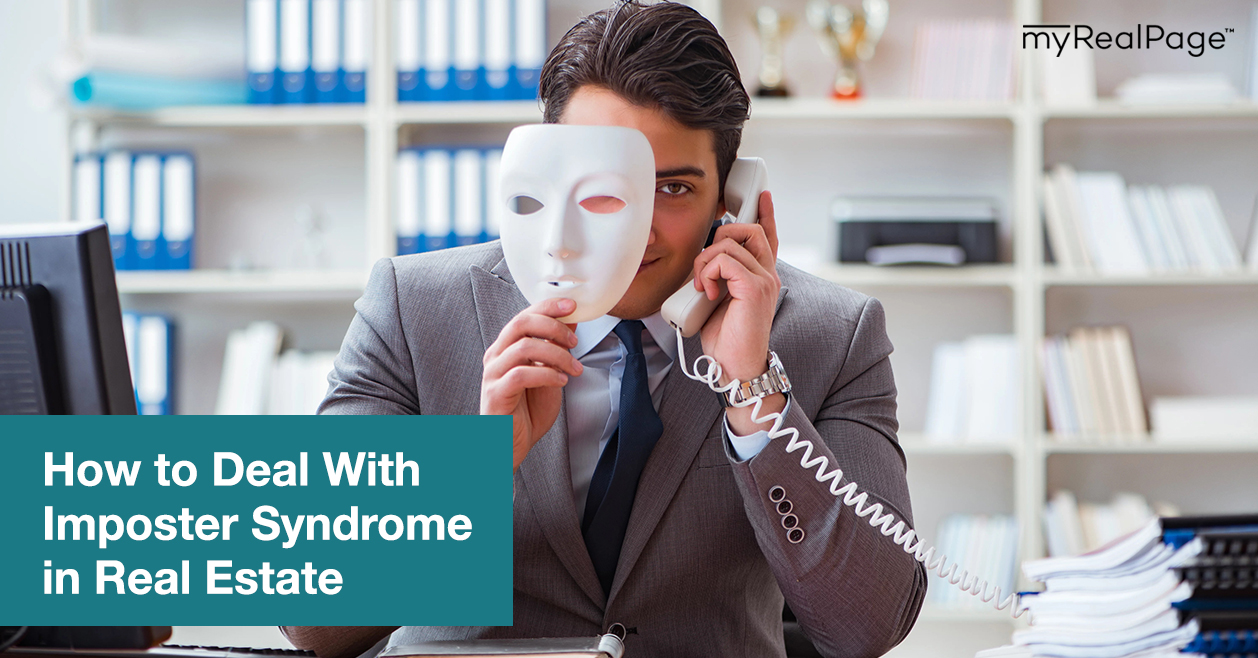How to Deal With Imposter Syndrome in Real Estate

Nod your head if this scenario sounds familiar:
You’re getting ready to meet with a new client. It’s something you’ve done dozens or even hundreds of times before. But for whatever reason, you feel entirely ill-equipped. Like you’re not the right person for the job. Like you’re faking your credentials and your experience, and your client is about to find out.
 Congratulations.
Congratulations.
You’ve experienced REALTOR® imposter syndrome.
Imposter syndrome — defined by the Oxford Dictionary as “the persistent inability to believe that one’s success is deserved or has been legitimately achieved as a result of one’s own efforts or skills” — doesn’t just affect real estate agents. Far from it.
Some 70% of all people experience it at some point or another.
It’s a normal, albeit challenging feeling for any professional. The key is knowing how to deal with it, so it doesn’t derail your success.
Here’s how to deal with feeling like an imposter in real estate.
1. Acknowledge what you’re feeling
The moment you start feeling ill-prepared or unconfident, hit the pause button. Take a moment to acknowledge your thoughts and feelings.
Attempting to ignore uncomfortable emotions and feelings of anxiety will only elevate them, making them harder to reign in. When we stop to recognize our thoughts and how they’re making us feel, we put ourselves in a position to recalibrate.
2. Make a list of facts to challenge your thoughts
When the moment of feeling like a fraud has passed and you’re back to your regular self, take a moment to write out facts about yourself and your business. Things like:
 How many homes you’ve helped buy and sell
How many homes you’ve helped buy and sell- The details of a glowing real estate testimonial (or five, or 10) that clients have given you
- Your years of experience
- Personality traits that make you a good agent
- The people in your professional real estate network
- The people in your personal network that believe in you
- Awards you’ve won
- Education and training that makes you well-equipped for your role
Don’t hold back. Think of this list as your defence against imposter syndrome; it’s a reference sheet you can pull out and read any time you’re feeling like you’re not qualified for or deserving of your job.
Hey, real estate beginners:
Notice that this list isn’t all about professional accomplishments. Personality, training and networks are just as important. On your list of facts, include a bolded statement at the very top that reads “Every single real estate agent starts as a beginner.”
3. Recognize the positive aspects of imposter syndrome
 While the symptoms of imposter syndrome certainly aren’t positive — the anxiety, the panic, the low self-esteem, etc. — the presence of imposter syndrome can signify positive things.
While the symptoms of imposter syndrome certainly aren’t positive — the anxiety, the panic, the low self-esteem, etc. — the presence of imposter syndrome can signify positive things.
Feeling like an imposter in real estate from time to time can mean that you’re challenging yourself. Trying new things, pushing for growth and going down new paths are always going to come with some discomfort and feelings of ill-preparedness. Maybe your case of imposter syndrome is a reflection of the personal and professional development you’re in the midst of.
It can also mean that you’re staying humble.
If you felt zero feelings of discomfort anytime you headed into a high-pressure meeting, that could be a symptom of an ego that’s gotten a little too big. While doubting yourself isn’t a good thing, feeling a tad nervous can be.
4. Get rid of imposter syndrome triggers
 Sometimes, those feelings of inadequacy aren’t completely our own creation. Sometimes, they’re spurred by external forces, or triggers.
Sometimes, those feelings of inadequacy aren’t completely our own creation. Sometimes, they’re spurred by external forces, or triggers.
The most common imposter syndrome triggers in our digital age: social media. Facebook, Instagram, LinkedIn and so on.
Seeing a fellow real estate agent proudly sharing their annual sales numbers or photos of their new car can spark feelings of insufficiency, making you doubt your own abilities.
Get rid of those triggers. Or at least disable them.
Opt out of seeing certain agents’ posts on your social media feeds, or unfollow them entirely.
5. Consider bringing in professional help
 If imposter syndrome is becoming a barrier to success in your real estate business, it might be worth seeking out the services of a business coach.
If imposter syndrome is becoming a barrier to success in your real estate business, it might be worth seeking out the services of a business coach.
The role of a business coach is to help you clarify your vision for your real estate business and establish an action plan for getting there. Like a personal trainer, they recognize your strengths and identify your areas that need work, and then provide the support to help you get stronger.
A business coach can help you overcome imposter syndrome by affirming that you’re capable and helping you position yourself for success.
Have you ever experienced imposter syndrome? Share how you handled it in the comments.


